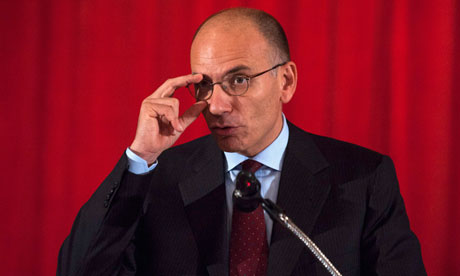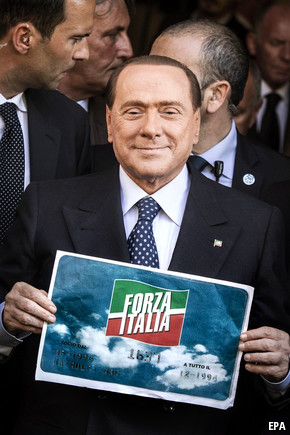http://www.theguardian.com/world/2013/sep/27/italy-coalition-politicians-fiscal-deal

Even though Berlusconi is prone to change his mind frequently, and his supporters make threats they do not carry out, it appears this time, one way or another, the Letta coalition is nearly finished.
Italy's president, Mr. Napolitano, said he would not succumb to pressure to dissolve parliament and call new elections, but what other choice can he make, unless Letta picks up votes from Beppe Grillos's 5-Star Movement?
Mike "Mish" Shedlock

Italy's coalition on brink of collapse as politicians fail to agree fiscal deal
Failure to agree on €3bn of budget measures underlines breakdown between Democratic party and People of Freedom

Italy's prime minister Enrico Letta, who has failed to secure backing in his fragile coalition for a €3bn package of fiscal measures. Photograph: Keith Bedford/Reuters
Italian prime minister Enrico Letta failed to secure backing for a vital package of fiscal measures on Friday as divisions with centre-right partners in his fragile coalition took the government to the brink of collapse.
Letta flew back from a visit to New York with coalition unity already in tatters after a threat by centre-right politicians to walk out over Silvio Berlusconi's battle against a conviction for tax fraud.
After two days of mounting tension and with financial markets on edge, he met ministers late on Friday in a last-ditch attempt to avert a rise in sales tax and secure approval for additional budget measures needed to bring Italy's deficit within European Union limits.
However, with the meeting still in progress, officials made clear that no deal could be reached.
"The conditions aren't in place at the moment," said one official.
Letta is now expected to go before parliament next week to seek support to continue in office.
Failure to agree on €3bn of budget measures, demanded by both Letta's centre-left Democratic party (PD) and Berlusconi's People of Freedom (PDL), underlined the breakdown between the two traditional rivals, which were forced together by last February's deadlocked election.
Economy minister Fabrizio Saccomanni, who has staked his credibility on meeting the EU budget limits and faced constant sniping from the PDL over recent months, was furious at the breakdown, officials said.
PDL politicans said proposals to avert the one percentage point rise in sales tax, scheduled to take effect in October, would have been funded by an increase in fuel taxes which would have punished consumers.
With the sales tax rise, passed by the previous government led by Mario Monti, due to kick in on Tuesday, prospects for a deal appear remote.
"We can't accept the blame for this," PDL secretary Angelino Alfano, who is also deputy prime minister, told the cabinet, according to one official. "We can't stay in the government if taxes are going up and there are no cuts to spending," he said.
Letta's left-right coalition has flirted with collapse ever since Italy's top court convicted former premier Berlusconi of tax fraud last month and sentenced him to four years in prison, commuted to a year of house arrest or community service.
On Wednesday, PDL politicians said they would resign en masse if a Senate committee meeting on 4 October votes to begin proceedings to expel their leader from parliament.
On returning to Italy on Friday after courting foreign investors in New York, Letta met President Giorgio Napolitano who, if the government fell, would have to either call new elections or try to oversee the creation of a new coalition.
A spokesman for the president's office said the head of state, who has repeatedly said he does not want a return to the polls, had given Letta his full support to seek the backing of cabinet and parliament.
If Letta, who has a commanding majority in the lower house, can secure the backing of a few dozensenators among PDL rebels or opposition parties including the anti-establishment 5-Star Movement, he could form a new coalition.
The political convulsions in the eurozone's third largest economy have increasingly worried investors, although with the European Central Bank guaranteeing stability in the markets, there has been none of the panic seen during previous crises.
At an auction of 10-year bonds on Friday, Italy's borrowing costs rose to their highest level in three months, while the premium investors demand to hold Italian debt rather than AAA-rated German paper widened to 267 basis points from under 250 at the start of the week.
and....
Thursday, September 26, 2013 10:56 PM
Italy on Verge of Downgrade to Junk; Silvio Berlusconi’s Supporters Threaten Mass Resignation from Parliament
Silvio Berlusconi supporters threatened to resign form Italy's parliament en masse today, even though a week ago Berlusconi himself said he would not end the coalition. To someone in the US, such a ploy makes little sense, because as soon as you resign, you lose your vote.
Parliamentary rules described below suggest there may be some merit in the idea, but I still think a coalition collapse by ordinary means (withdrawing support) is more likely. Regardless, one way or another, the threat of a coalition collapse is back in the picture.
In response to the threat of a government collapse Standard & Poor’s warned of a further downgrade “by one notch or more” if Italy could not demonstrate “institutional and governance effectiveness”. Italian sovereign debt is just two notches above junk.
The Financial Times reports Italy PM Letta returns to resignation threat from centre-right
Parliamentary rules described below suggest there may be some merit in the idea, but I still think a coalition collapse by ordinary means (withdrawing support) is more likely. Regardless, one way or another, the threat of a coalition collapse is back in the picture.
In response to the threat of a government collapse Standard & Poor’s warned of a further downgrade “by one notch or more” if Italy could not demonstrate “institutional and governance effectiveness”. Italian sovereign debt is just two notches above junk.
The Financial Times reports Italy PM Letta returns to resignation threat from centre-right
Fresh from assuring potential Wall Street investors that Italy was “young, virtuous and credible”, prime minister Enrico Letta was heading back to Rome late on Thursday to save his coalition government from collapse after Silvio Berlusconi’s supporters threatened a mass resignation from parliament.Time Running Out For Letta Coalition
The 76-year-old former prime minister – convicted last month for tax fraud and also appealing against a separate conviction for paying for sex with an underage prostitute – threw the government into chaos on Wednesday night when his centre-right Forza Italia party warned it would quit parliament if a senate committee voted to expel its leader from the upper house next month.
As Mr Letta has repeatedly warned, Italy can ill afford higher costs in servicing its €2tn of public debt, with its budget deficit for 2013 currently forecast to overshoot the 3 per cent limit agreed with the EU.
A mass resignation from parliament would cause legislative chaos just when the government must seek approval for its 2014 state budget. Parliamentary procedures dictate that each resignation must be voted on individually, a process that would have to be repeated if deputies nominated to replace them also resigned.
Renato Brunetta, lower house leader for Forza Italia, told the Financial Times he was already collecting resignation signatures from the party’s 188 MPs. He declined to say how many he had received so far.
With the head of state adamantly opposed to dissolving parliament, politicians are scrutinising whether Mr Letta could find the 30 or so votes he would need in the senate to form an alternative majority. Opinion polls show that elections would lead to a repeat of February’s hung parliament, with the anti-establishment Five Star Movement once again holding the balance of power.
Even though Berlusconi is prone to change his mind frequently, and his supporters make threats they do not carry out, it appears this time, one way or another, the Letta coalition is nearly finished.
Italy's president, Mr. Napolitano, said he would not succumb to pressure to dissolve parliament and call new elections, but what other choice can he make, unless Letta picks up votes from Beppe Grillos's 5-Star Movement?
Mike "Mish" Shedlock
http://www.economist.com/news/europe/21586894-silvio-berlusconi-keeping-italy-tenterhooks-still-puppet-master
Still a puppet master
Silvio Berlusconi is keeping Italy on tenterhooks

VITRIOLIC slanging matches in current-affairs talk-shows on Italian television mirror the country’s politics. It is more turbulent than ever after the supreme court upheld the conviction for tax fraud of Silvio Berlusconi, formerly prime minister. In the eight weeks since the court confirmed a four-year jail sentence (which will in effect be just one year of house arrest or community service), Italians have been subjected to more verbal mudslinging than usual. And they have been kept on tenterhooks about the survival chances of Enrico Letta’s fragile coalition government.
Ever the showman, Mr Berlusconi has recently monopolised front pages and television headlines. On September 18th, the day a commission of the Senate, to which he was elected in February, took a step towards his expulsion, he bashed the magistracy and the centre-left Democratic Party (PD) in a recorded television message lasting 15 minutes. He vowed to continue to lead his centre-right People of Freedom (PdL) party, a partner in the left-right coalition, even if expelled from parliament. Since then, logos in PdL offices have been changed back to Forza Italia (Go, Italy), the name of the movement he established in 1994 that brought him his first political success.
The name change is part of preparations for an election. So is the appeal against moves to expel him from parliament that Mr Berlusconi submitted this month to the European Court of Human Rights. Many Italians sympathise; but to others the appeal to the court is further proof that he has spent his time in politics working mostly for his own interests. Faced with a party led by a convicted tax fraudster, Mr Letta’s PD ought to be performing strongly, but it is beset by wrangling over its leadership.
The hawks and doves around Mr Berlusconi are debating whether to pull out of the coalition, creating uncertainty over how Italy can be governed. Urgent business remains untackled, particularly the budget for next year, through which both sides of the coalition will try to gain points with voters. Mr Letta has said that he is not willing to be worn down by sniping from the PdL Fabrizio Saccomanni, his treasury minister, has hinted at resignation if his budget is undermined. On September 23rd Giorgio Napolitano, the president, called on politicians to avoid a rupture and to nurture feeble signs of economic improvement. Mr Napolitano has said that he will not dissolve parliament under the existing electoral law.
The slow pace of Italian justice is partly to blame for the uncertainty. In confirming the jail sentence, the supreme court referred back to a court of appeal the question of how long Mr Berlusconi should be banned from public office. The appeal court should decide in October. This will settle only part of the question about the future of the PdL leader.
No comments:
Post a Comment